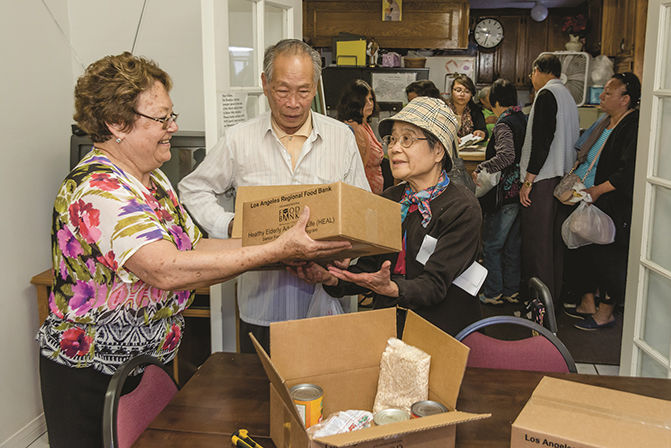Practicing the three Lenten disciplines of prayer, fasting and almsgiving requires some sacrifice. Some may be tempted to believe that “two out of three ain’t bad.”
Almsgiving should flow from the disciplines of prayer and fasting. Moving closer to Christ and entering into his suffering becomes an encounter with his sacrifice done out of great love.
Jesus held nothing back. He gave all for each of us, suffering even death on the cross. He is the ultimate selfless giver, and to encounter him is to not only seek his love and mercy, but to also offer his love and mercy to our brothers and sisters, especially those in need.
We often pray, “Lord, have mercy on me.” We come as beggars seeking hope, grace and answers to prayers. The Greek word for mercy, eleison, comes from the same root as our word almsgiving.
Being a disciple of Jesus requires giving of ourselves to others and being merciful. In desperate faces of those in need we must see the face of Christ crucified, the Christ who cries out, “I thirst.”
“Whatever you did for one of these least brothers of mine, you did for me,” Jesus said (Matthew 25:40). Christ tells us we must show this love and mercy to others to inherit his kingdom.
“There are two themes of Lent: repentance and baptism,” said Msgr. Gregory Cox, executive director of Catholic Charities of Los Angeles. “We sometimes forget the commitment we make to God and each other in our baptism. Lent invites us to slow down and reflect on whether we are really growing in the commitment of faith made in baptism.”
Almsgiving unites us to the perfect sacrifice of Christ on the cross.
“As Christ’s sacrifice brings us hope, our sacrifice towards others is with the idea of bringing hope into people’s lives,” said Msgr. Cox.
A homeless person may pray for shelter, food or warm clothing. A mother may pray that her runaway son who is addicted to drugs be safe and find help. A young pregnant woman may pray for guidance and support. Our almsgiving becomes an answer to these prayers and others like them.
“God often answers the prayers of others through us,” said Msgr. Cox. It may be that these people find an agency, a non-profit organization or church ministry that will help them. These organizations are able to exist and do their work because of the sacrifices people are quietly making behind the scenes, offering resources through an act of love.
There is no shortage of opportunities to give alms. There are often opportunities at the local parish through ministries or a food pantry. There are also organizations like Catholic Charities, which offers many services locally and nationally. Catholic Relief Services works internationally, bringing hope to those in need.
Find a way to give that has meaning for you. Research some organizations online to see what work they are doing before you decide.
You can also volunteer time at a charity or non-profit organization, in a parish ministry, in the neighborhood or within the family. Volunteering to help an elderly family member with chores, an elderly or ill neighbor with rides or meals, mentoring a small child or aiding a single parent are all also forms of almsgiving.
“The contributions may not seem big to the person giving it, but it is big to the person receiving it. It is also big to our Lord,” said Msgr. Cox.
“It is a great feeling to give, but the driving force should be the need to make a sacrifice for someone else,” he said. “We need to make the sacrifice out of an act of love. Not because I have to or someone is making me, but because it is an act of love. It is a sacrifice made to bring hope into people’s lives.”
This is what the Lord has done for us, and as Christians, this is what we must now do for those in need in our communities. Jesus suffered tremendous physical and emotional pain so that we would have an opportunity for eternal salvation.
Sometimes we don’t take seriously enough the works of mercy that God is asking of us. Lent is a time to reflect on these things and recommit ourselves as people of faith.
“It says an awful lot where we spend our financial resources. It also tells us to what degree are we willing to make a sacrifice to bring the hope that Christ gives us to others,” Msgr. Cox said.

